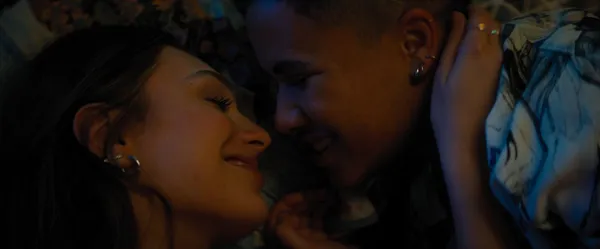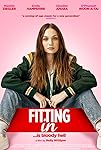Eye For Film >> Movies >> Fitting In (2023) Film Review
Fitting In
Reviewed by: Jennie Kermode

It’s a cliché that teenagers feel awkward about their bodies, growing up – that they worry that they’re different from others. Sometimes, though, it’s true. And whilst most differences are nothing like as big a deal as they imagine, mainstream society’s taboos around sex and gender mean that any variation in that area can reshape one’s whole life.
Lindy (Maddie Ziegler) is 16 but still hasn’t got her period. She’s not too worried, knowing that it comes late for some people, though she does find the fuss made by her mother, Rita (Emily Hampshire) annoying, and she lies about it to best friend Vivian (Djouliet Amara) because she just wants to fit in. Although Rita is a single mother who has recently recovered from breast cancer, Lindy’s life is pretty good. She’s happy at school and the mutual crush she shares with classmate Adam (D’Pharaoh Woon-A-Tai) is on the verge of going somewhere interesting. Then she gets an unexpected hospital diagnosis, and everything falls apart.

Mayer-Rokitansky-Küster-Hauser (MRKH) affects around one in every 4,500 women. One of them is director Molly McGlynn, who made this film partly as part of her awareness-raising work, but partly because she has observed something that many people with VSCs (variations of sex characteristics) observe but that few are in a position to call out: the absurdities of how other people react to them. This gives the film a rich subtext to work with, whilst its focus remains personal and experiential.
There is cruelty here – much of it unthinking – compounded by the pain of suddenly having to deal with being a social outsider at the point in life when one is most socially vulnerable. Whilst this might seem over the top in places, it’s deeply rooted in truth, as anyone diagnosed with a VSC in adolescence will recognise. The pressure on a distressed young patient to ‘consent’ to being gawped at by medical students. Doctors talking to her mother about her, in front of her, rather than to her. Even the music that plays in the MRI scanner. Her mother, trying to be supportive, gives her a copy of The Vagina Monologues – a book which completely elided VSCs (due to ignorance, for which its author later apologised). Other people’s worries on her behalf threatening to make her neurotic about things she was coping well with. The impact of ill-considered school biology lessons. In accumulation, it’s agonising, but it is also, often, hilarious in its clumsiness, and McGlynn paces it in a way that allows for this humour to break through. It’s an entertaining way for the wider public to learn, and for those who have had similar experiences, it’s sweetly cathartic.
Surrounding all this is the usual pressure surrounding female adolescence – the constant fixation of adults and peers alike on intimate bodily changes, and the seeming omnipresence of those subjects in popular culture too. Lindy and Adam watch Ginger Snaps together; he tells her that his favourite film is Carrie. She uses her new dilators whilst listening to a certain Peaches song and we get a montage of black and white imagery featuring trains rushing into tunnels.
Growing up this way today, however, is not what it used to be. Lindy has already encountereed a local non-binary teenager, Jax (Ki Griffin), who has a rather obvious interest in her; she subsequently discovers that they’re also intersex, and has an early introduction to the politics of bodily difference, encouraged to think not just about what’s ‘normal’ but about what she wants. As her mother deals with the impact of mastectomy on her feelings about her own gender and her prospective desirability, Lindy reevaluates aspects of her relationship with Adam and begins to embrace a form of femininity less dependent on masculine approval.
Fluent in the visual language of teenage romcoms, McGlynn uses warm lighting and colours popularly associated with femininity. Thea Hollatz’s production design gives us teenage bedrooms that really feely lived in , and speak to the complexity of their residents, without straying too far from the John Hughes playbook. The film explores aspects of gender and identity in myriad subtle ways, and celebrates a generation which is increasingly making room for complexity and ditching expectations of shame and secrecy. Although there’s an increasing number of films on related subjects, this is the first to adopt the language of mainstream cinema with such success. In doing so, it loses none of its wit, but achieves something jubilant.
Reviewed on: 09 Sep 2024

















